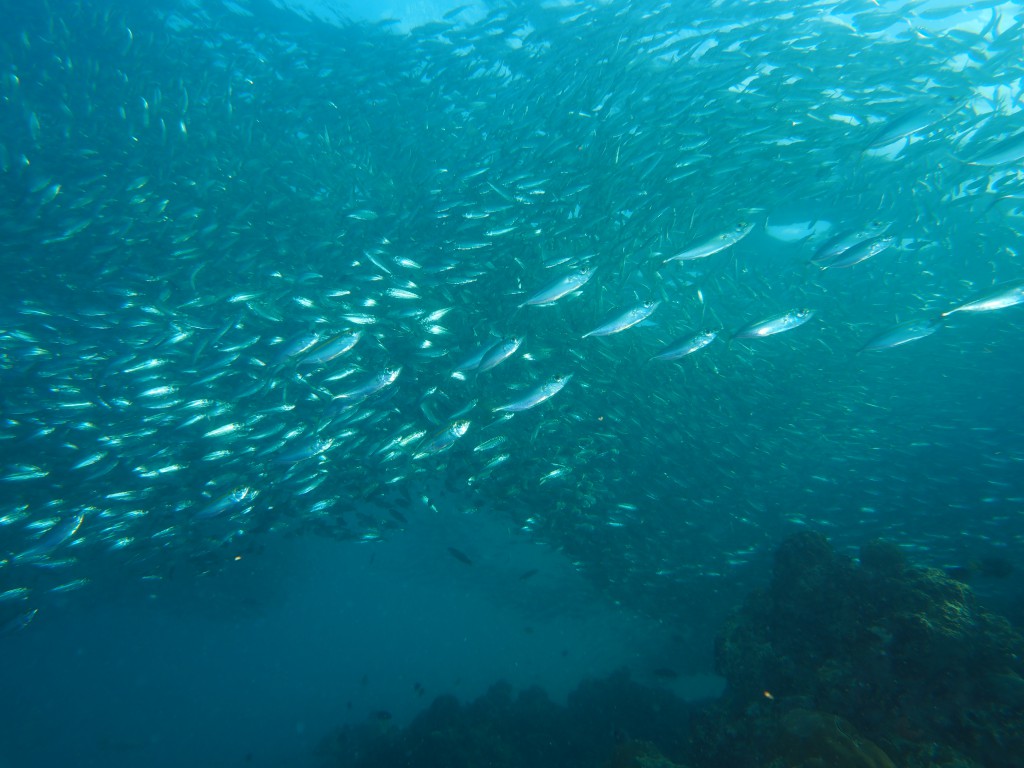On the ground (and in the water) looking at fisheries reform in the Philippines

By Susan Ruffo, Bloomberg Philanthropies Environment Team
Over 1.6 million people in the Philippines make their living on the sea or directly connected to it, and 56 percent of the average protein intake of Filipinos comes from fish. In a country that is growing rapidly, with a population that is increasing and looks to the sea for its sustenance, those numbers emphasize the need to protect the country’s marine resources to ensure the growing population has a bright future.
Recently, we had the pleasure of visiting the Philippines to talk directly with our Vibrant Oceans partners there, Rare and Oceana. We also met with national government officials and local community members who are working to protect and restore their oceans to see how they are working together to ensure the sustainability and longevity of their fisheries. We got a firsthand view of the dedication, creativity, and hard work that is going into making the Philippines’ fisheries more productive and sustainable.
Bloomberg Philanthropies launched our Vibrant Oceans initiative in January 2014 with the idea of working with best in class partners – Rare, Oceana, and Encourage Capital – to simultaneously reform industrial and small scale fisheries, while identifying where and how private capital could be employed to make these changes stick. The results in the Philippines have been encouraging.
At the national level, officials like Director Perez are working to ensure that the Philippines has strong regulations in place for combating illegal fishing, and that officials have the ability to enforce those laws and prosecute violators. Partners such as Oceana, which advocates for strong laws and helps provide training on enforcement, are helping the Bureau. The result is increased action on the water where it counts. In Tañon Strait for example, criminal cases have been filed against four violators since joint patrols of the fisheries and environment agencies, along with local government units, started in September this year.
Director Perez’s dedication is matched by mayors working in communities to protect their own fisheries. In the province of Negros Oriental, mayors of Bindoy, Aungon, Tayasan, and Manjuyod are working with Rare to develop new programs to engage fishers and protect their future. In the Philippines, municipalities have jurisdiction over their own waters, giving them the opportunity to establish and implement exclusive access zones for their fishers, complete with no-take areas designed to allow fish populations to breed and rebuild. Rare is working with these communities to ensure they have the technical knowledge and social marketing capabilities – personified in mascots and local campaigns – to make their plans real. And the results come fast – in only two years, the first set of communities Rare worked with saw increases in fish abundance of 18 percent – not a bad return!
Ultimately, all this work comes down to people. Fishers know their waters and their trade. They can tell when things are not going well, and are the last people who want to see their resources disappear. So when they see an alternative to overfishing, they take it. In Bindoy, fishers and their families have embraced the new marine reserve and signed up to be official caretakers. This band of rangers watches over their no-take area, sleeping out in the guard station and patrolling the waters to ensure that what they have built will last. And they are seeing the benefits – increased catches, which translate to increased incomes. Contrast this with recent stories about the terrible human rights abuses taking place on the high seas (see Ian Urbina’s recent piece in The New York Times on trafficking of Filipino seamen), and the full impact of this work becomes clear.
And these communities are not alone. Increasingly, buyers of seafood across the globe are committing to source only sustainable seafood, but they face challenges in knowing where it comes from. Organizations like Rare and Oceana, with the communities and companies they work with, can fill that gap. Analysis by our partner Encourage Capital has shown that investing in communities like Bindoy and processing companies that can get their products to market is not only good for the community and the company, but also for investors and fish stocks. The key is making sure all the actors are working together.
We are grateful for the chance to see so much of the Philippines, and talk directly to the people who are working so hard to protect their homes and livelihoods. Their passion and commitment was inspiring, and will serve as a model not only for others in their country, but also globally. We were warmly received, and welcomed with pride and hospitality. We are already looking forward to the next trip to see even more progress being made, and maybe have just a bit more of that amazing – and sustainable – seafood.